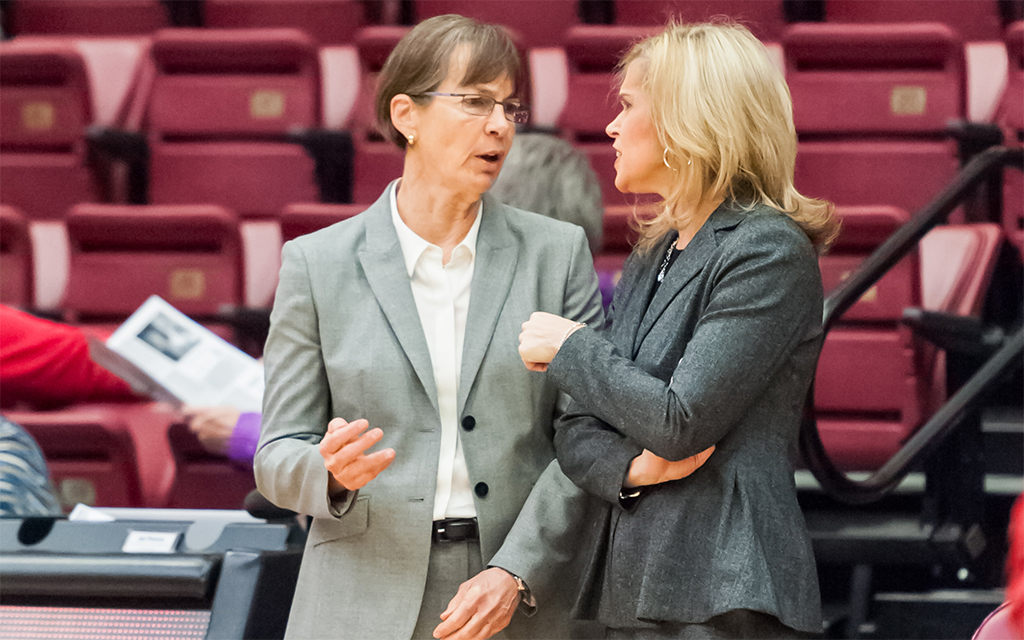TEMPE – As the clock ran out on yet another Stanford win in Maples Pavilion on Jan. 21, the Cardinal-clad crowd rose to a standing ovation as its matriarch of nearly four decades was crowned queen of NCAA basketball.
Stanford’s 65-56 victory over Oregon State was No. 1,203 for Cardinal women’s basketball coach Tara VanDerveer. With it, she surpassed former Duke coach Mike Krzyzewski’s for the most career wins in NCAA history.
VanDerveer now stands atop the realm of college hoops, as the wide world of all of college basketball admires her arresting accomplishment.
“Tara is, as the young people say, is the G.O.A.T.,” said Arizona State women’s basketball coach Natasha Adair. “What she means to the game, she’s a pioneer, she’s a trendsetter… I can’t say enough about what she means to the game, what she’s done for our league and the example that she sets for coaches that can follow in her footsteps. (I’m) proud that she represents the (Pac-12).”
While the sport has been forever altered for the better by VanDerveer’s work, one coach in particular can offer an inside perspective on Stanford’s transformation from a national bottom feeder into a Pac-12 and national powerhouse under VanDerveer’s guidance.
Former ASU coach Charli Turner Thorne played at Stanford during VanDerveer’s first three seasons in Palo Alto and helped build the foundation not only of the Stanford dynasty but also her own future head coaching career first in Flagstaff at Northern Arizona University and then in Tempe, where she led the Sun Devils to the NCAA Tournament 14 times.
Manning a guard spot on “The Farm” from 1984-1988, Turner Thorne found out what VanDerveer was about long before the Cardinal began collecting conference and national championships. Having taken the Stanford position after multiple successful years with Ohio State, VanDerveer vaulted the Cardinal in just three years, from the depths of 9-19 in Turner Thorne’s first year under Dotty McCrea to the NCAA Sweet 16. With Turner Thorne as a senior leader, it was the deepest postseason run Stanford had ever made at the time.
In a swift and sustained rise to prominence, Turner Thorne cited VanDerveer’s now-renowned attention-to-detail approach, prioritizing hard work and determination. It is a formula that has become a staple of Stanford basketball through the years.
“It was intense, and it was cerebral,” Turner Thorne told Cronkite News. “I think she coached us to play smart, organized basketball. It wasn’t just like, ‘Get a bunch of talent and roll the balls out.’
“Some of the stuff that I had in my notebook – I still have my Stanford notebooks – and the goal sheet that I had, with mental goals on offense and defense, was a template that I used and changed over the years until my last days in coaching. That kind of organization and prep and attention to detail were some of the things I took.”
VanDerveer credits that 1986 team, which took the punches of a sub-.500 record, for paving the way to what the program would soon become, as the Cardinal rose to the Sweet 16 by 1988.
“We weren’t big enough. We weren’t athletic enough. But the culture that they established was a sisterhood, a love for Stanford, and an unselfishness,” VanDerveer said. “They were not afraid to (help) recruit players who might come in and get their playing time. They were all about Stanford.
“It was the beginning of the Pac-10 then, and we were at the bottom. They were fearless. Their enthusiasm was a big part of the fuel of why we were able to turn it around quickly and become successful.”
Without a professional league for women’s basketball after graduation, Turner Thorne decided to follow in her coach’s footsteps and look to lead from the sidelines herself.
“Mainly, I worked basketball camps to make a little extra money and train during the summer,” Turner Thorne said, remembering her early days. “So working Tara’s camps was really formative for me. That’s where I figured out, ‘I like coaching. This is fun.’
“We’d get competitive. It was old school. I really got the bug working camps, and I always worked all of Tara’s camps. That whole structure that she had honestly probably motivated me.”
VanDerveer remembers Turner Thorne as a “very, very good student.”
“She could’ve gone into anything that she wanted to, and she would’ve been very successful,” she said. “But basketball is so much fun. Why not coach if you can? She went on to have a great career.”
Serving as an assistant at Washington and Santa Clara before taking the head coaching reins at NAU, Turner Thorne used many of VanDerveer’s teachings as rungs to ascend the college basketball ladder and gain mother-like status at Arizona State. Over 25 seasons with the Sun Devils, she earned the program’s most wins as a coach before retiring in 2022 with a 488-294 record at ASU. She returned to the bench a year later, this time as an assistant coach with the Phoenix Mercury.
“When I left (Stanford), she’s like, ‘Charli, two things: Be loyal and work hard,’” Turner Thorne said. “That was great advice for a young assistant. Having high standards, get what you ask for. If you don’t ask for much, you’re not going to get much. Getting people to their best spot, you have to push, you have to be uncomfortable. People aren’t always going to like you. And that’s okay, as long as they trust and respect you and you help them grow. I think that was the biggest thing.”
Taking over in Tempe in 1996, Turner Thorne molded the Sun Devils into an NCAA tournament regular off the expectations and exertion learned from VanDerveer, qualifying for the Big Dance in 14 of her 25 campaigns in the desert while suffering just six losing seasons.
“Every championship program has high standards,” Turner Thorne said. “That was the biggest thing right away. We were getting pushed and challenged to the extreme every single day, which I came to really appreciate and feel like that’s what great programs do.”
Every now and again, though, she would be reminded of where it all started, as she and VanDerveer faced off on the court for over two decades as conference rivals. Despite the sentimental value, both Turner Thorne and VanDerveer tapped into their competitive nature every time a ball was tipped between the Sun Devils and Cardinal.
“It took time to be able to have a roster where we competed (with Stanford),” Turner Thorne said. “I don’t think I really thought about Tara. There’s the gauge, there’s the standard. That’s how I looked at our games with Stanford.”
“You would talk about it, or think about it, but once the game started, it didn’t matter who was sitting on the other bench,” VanDerveer said. “Charli did an awesome job here as a coach. I loved coaching her, she is extremely competitive, hard-working, very intelligent. Everyone has to kind of figure out what their time is. Now she’s doing a great job announcing. She left a great legacy here.”
After two and a half decades of success, Turner Thorne retired from her position following the 2021-2022 season, leaving behind the lessons she learned from VanDerveer that helped construct a tradition of success in Tempe.
VanDerveer is the standard of excellence now in college basketball, and Turner Thorne’s experience under her not only helped launch Stanford’s climb to success, it charted Arizona State’s path to national relevance and respect under Turner Thorne’s own leadership.
“The fact that she got something (from) being at Stanford, being a coach, I’m proud of her,” said VanDerveer, grinning.

